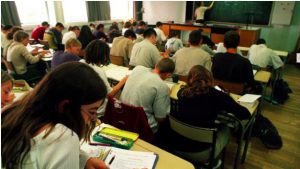…. HUMAN RIGHTS ….
An article from the Danish Institute for Human Rights
A new UN resolution on Human Rights Education emphasizes the strategic role of National Human Rights Institutions concerning the promotion of human rights education.

The United Nations Human Rights Council agreed on a new resolution on Human Rights Education and Training at the Human Rights Council’s Thirty-first session this spring. The resolution reconfirms and supplements state parties’ commitment to national implementation of international standards for human rights education five years after the UN Declaration on Human Rights Education and Training from 2011. Due to a timely and targeted effort and a fair portion of good luck, The Danish Institute for Human Rights manged – through the international coordinating committee of the human rights institutions (GANHRI) – to give NHRIs remarkable space for manoeuvring on the educational scene.
Human rights education is important in order for children, youth and adults to know their rights and duties and to respect and uphold the rights of others. Moreover, it’s important that duty bearers such as teachers, police, social workers and other civil servants who act on behalf of the state, know their duties to respect, protect and fulfil the state’s human rights obligations whether behind the desk formulating policies or acting on the ground with vulnerable citizens.
The new resolution text reads that states “Recognizes the important role of national human rights institutions in promoting effective policies on human rights education and training, and calls upon them to contribute further to the implementation of human rights education programmes”.
(Article continued in the right column)
What is the state of human rights in the world today?
(Article continued from the left column)
“This is the first time we see a resolution on education which stresses the strategic role of NHRIs on promoting effective policies for human rights education and training. Focus has shifted from NHRI assisting in conducting education programmes on human rights, to assisting in the development of effective policies at the structural level. In other words, this reflects the shift in focus amongst NHRIs to work across their NHRI mandates such as coordination, giving advice and monitoring on human rights education. They will thereby have a more far reaching and sustainable impact on the education sector”, says Cecilia Decara, Senior Adviser at The Danish Institute for Human Rights who has worked on impacting the resolution together with Olga Ege, who is also a Senior Advisor at the institute.
The new paragraph also have a deep impact on the work of NHRIs, says Cecilia Decara: “It reflects that there is a need for NHRIs to work both on the structural level influencing the adoption of effective policies for human rights education, and also contribute to the implementation of programmes. It’s the conjunction of working at both levels, which qualifies the monitoring and follow up process e.g. giving advice to duty bearers.”
The new resolution will be helpful to set a further framework for our advice and network on human rights education with less experienced NHRIs, Cecilia Decara adds.
The UN Human Rights Council also decided to “convene at its thirty-third session a high-level panel discussion to mark the fifth anniversary of the United Nations Declaration on Human Rights Education and Training”. This high-level panel discussion will focus on good practice and challenges of the implementation of the declaration.
(Thank you to the Global Campaign for Peace Education for calling this article to our attention)